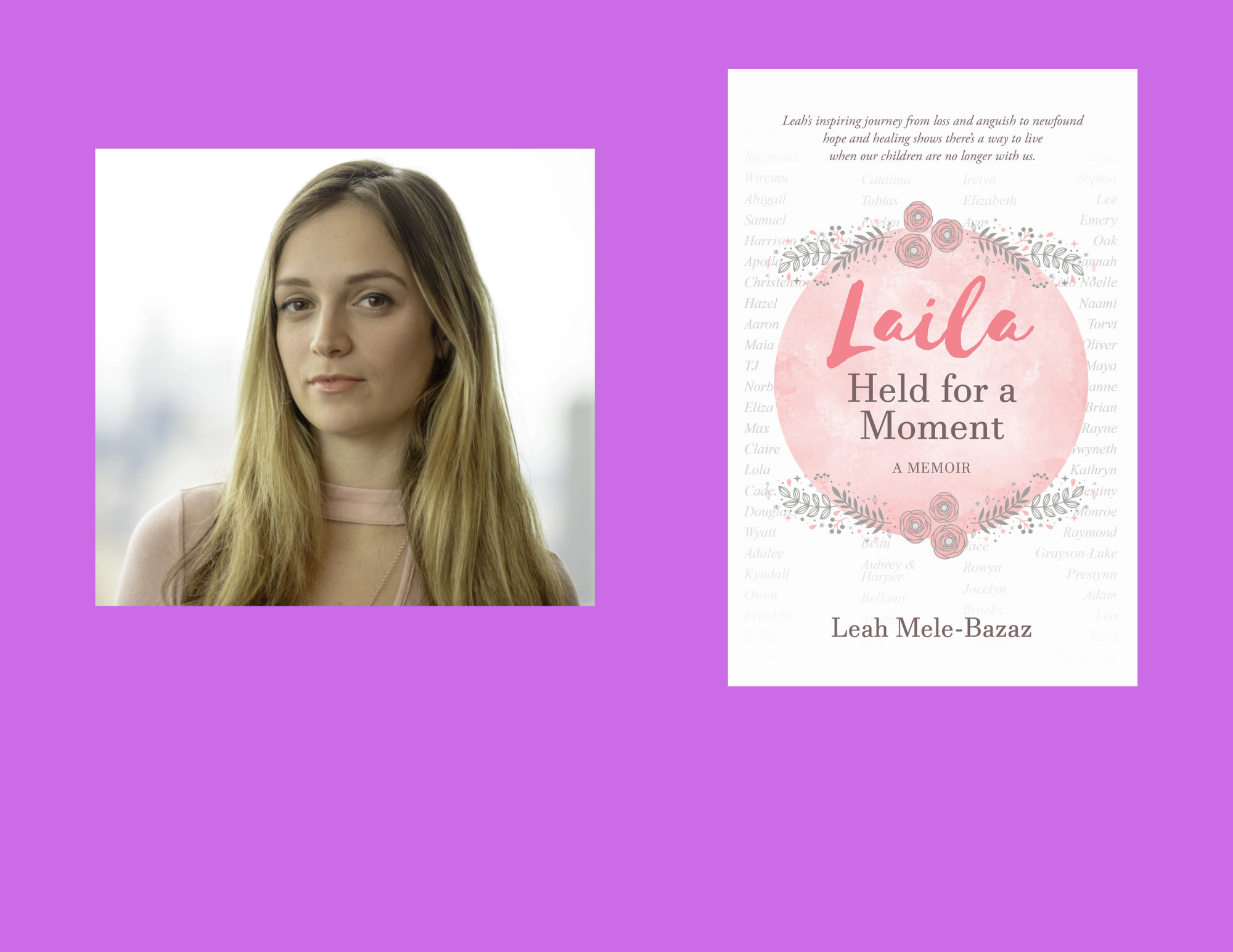In her new book Laila: Held for a Moment, Leah Mele-Bazaz shares her personal journey of giving birth to her stillborn daughter Laila. We see her navigating through trying times that dealt with heartbreak, depression, grief, and a search for hope. I had the honor to sit down with Mele-Bazaz to discuss the process of writing Laila: Held for a Moment.
Aamna Rehman: To start, you did not have to write about such a personal journey, but you decided to. What made you want to write about your experiences and share them with others?
Leah Mele-Bazaz: I originally didn’t want to ever write a story about it. I remember being in the hospital and thinking that writing about something like this would be too personal, it would be something that goes against how I should proceed with this situation. I felt like I should be quiet about it and then I thought a lot about my great-grandmother and what she went through.
In her adult life, she had a daughter who had died and wasn’t able to ever talk about it and she just had this silence that seemed to have eaten away at her. I realized very quickly right when I got home from the hospital, “No, I want to write a story about this—it feels important. It feels like if I don’t write, I don’t know how I survive it.” For me, the gut impulse was don’t ever write about it, and then quickly I realized it was a story that I wanted to share.
AR: You mention your family members and close friends in the text. Did you face any criticism from them when you told them that you are releasing this out to the world?
LMB: No, I didn’t! I kind of kept quiet about it at first. I was going to some writing workshops and getting some feedback there. My family was supportive of it. My husband at first, because it was such a personal situation, seemed a little unsure, but once he read the material, he was really moved by it.
AR: What setbacks did you face before and after writing the memoir?
LMB: I took a few writing courses. One person in a writing workshop told me that they never would trust a narrator who was superstitious. I do have this element of superstition throughout my book about symbols that I see in my life and kind of weave that voice throughout. At first it wasn’t in the manuscript because of what he said. I felt like I wanted to create a narrator where people could believe me and kind of follow my story, so I was worried if I added in that element then people would not be as invested in the story. But I ended up getting a really positive reception once I added it and kept it in there.
That was one of one of the setbacks. Like how far I can go with my voice as well as keeping the integrity of the story? So, being able to own that voice and just claim it as myself was really helpful in the process.
AR: How does it make you feel to know you have an impact on those who come across your memoir?
LMB: I think it’s definitely a nervous feeling. It officially gets published in October 2022 so I think it might be a whole range of emotions on the actual publication day. But overall, it’s been getting a really nice reception from writers that I admire, which is super helpful and helps build my confidence as a new writer.
AR: There are many references to Philly; you mention many street names and other locations. Why was it important for you to highlight Philly and all its glories?
LMB: Especially when I was pregnant, I kind of had this love-hate relationship with Philly that I think every Philadelphian faces at some point or another. I remember being worried about raising a kid in Philly and not having access to my family. There was this push and pull from the city and as I was revising and as I was writing I realized that it’s a place that holds memories of my first daughter. So, I built a new relationship with the city through this process. Realizing from certain walks through the park or passing by the hospital that I delivered in, made it feel like a very special place now so reclaiming the city and my relation to it felt important. A lot of stories aren’t set in Philly, at least the ones I’ve read, so really showing readers the things I loved about the city felt important too.
AR: What I find beautiful is the name you chose for your daughter and the meaning behind it. Can you explain your interest in learning Urdu and that culture as a whole?
LMB: When I was younger, I was always really passionate about learning about different cultures. My high school only offered Spanish and at UPenn they had a program where they offered high school students the chance to learn a language that’s not traditionally offered in the public school system. One was Hindi but the class ended up getting booked quickly so they put me into the Urdu class. I ended up making some really great friends and one thing that always has stood out in my mind was that we put on this skit at the end.
We basically practiced our language by recording this skit and speaking in Urdu. I played an Indian bride, and it was just a thing that stood out in my head. Then when I did get married to my husband, who’s Indian, having that traditional outfit on again was a very surreal moment where it felt—again it goes back to that voice of intuition that kind of comes out throughout my writing, but I like to try to circle memories back to show that events in my life led me up to meeting him.
AR: You also talked about the nightmares you had after you gave birth to Laila, can you explain those in further detail? What did you see and how did they stop?
LMB: It was my first pregnancy and I realized that I did have a lot of anxiousness about being a new mother. I still was in a pretty new relationship; my husband and I only were dating for a year. Also, I was working at an entry-level position at my current job. I just felt like I wanted to be in a different place. This motherly worry that I had in my head, and I think that anxiety definitely shows throughout the text where then I started thinking that maybe something was wrong. I wanted to act like I had it all together but also honor that intuition that I had.
Unfortunately, I ended up giving into trying to be quiet, trying not to think something was wrong when it was… I definitely use dreams and nightmares as a way to help inform the text because I do feel like they hold really deep meaning and I was glad I was able to share that with the readers. I continue to have nightmares but a lot of them, while they may seem like nightmares are also, I feel, like guidance and help inform me and my day-to-day decisions.
AR: What would you say to other couples going through a similar experience to yours?
LMB: The important thing is that you are not alone. It is a historically silenced topic; a lot of people don’t want to open up, whether it is about fertility issues or pregnancy loss or infant loss that a lot of couples go through. Reminding people that there is this collective experience. Actually, on my book cover are the names of the children whose families I met, and their kids passed away. The cover also serves as a reminder that my story is just one of all these stories.
AR: After going through such a significant journey and releasing the memoir, what was your biggest takeaway? What did you learn?
LMB: In terms of what I learned, seeing the book itself brought me closer to Laila. Seeing her name out there and I’m so happy that I have her name on the book cover because I feel like she is still there, and her story is making an impact. So, the biggest lesson learned is that I’m so glad that I decided to tell my story not just for me but for the other families going through it and for the other people who may not have known about a subject like this and learned more about it.
AR: Well put! With that being said, what is next for you?
LMB: I’m working on a book about my second daughter. She is healthy, she’s a toddler, she’s super goofy. And writing about what we call in the loss community “a pregnancy after loss.” A lot of the times women have post-traumatic stress or anxiety during their subsequent pregnancy, so writing about that. My sister and I were pregnant at the same time for my second pregnancy, so writing about the sisterly bond that we have and how it brought us closer together. It helped her understand what I went through on a different level now that she was also becoming a mother. I’m hoping to make it a little lighter and bring some humor into it too.
AR: Thank you Leah, for sitting down with me and allowing me to learn more about you and your memoir. To learn more about Leah and her book check out her website.

Aamna Rehman is a senior at Drexel University majoring in Communications with a concentration in Journalism. Her love for creating meaningful pieces of art varies from writing, painting, and music. She enjoys spending time with her family, friends, and pet bunny. She hopes she can continue to create valuable work that inspires others to do the same.
